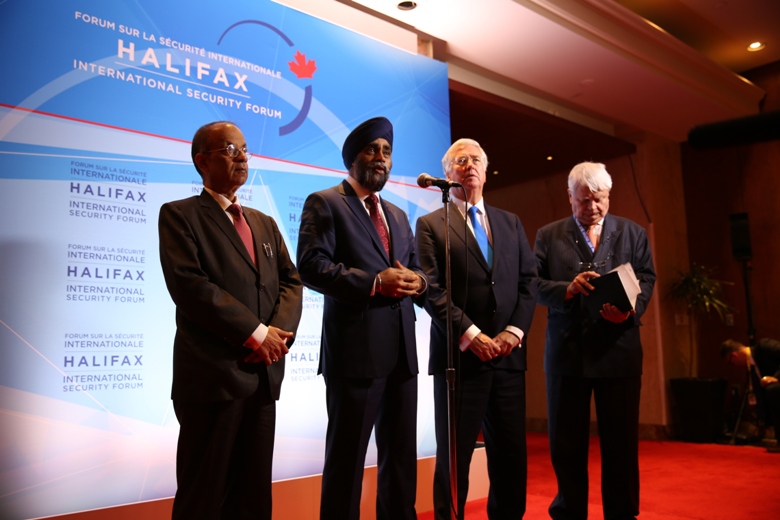Defence Minister Harjit Sajjan says he’s looking forward to meeting with a large delegation from Washington this weekend at an international security summit in Halifax, but dodged specific questions about President-elect Donald Trump.

Sajjan struck a cautious and conciliatory tone on Friday morning as he was peppered with questions about Trump’s presidency and what it could mean for defence spending and strategy in Canada.
Trump has, among other things, threatened to pull the United States out of NATO if other countries don’t start pulling their collective weight.
READ MORE: Vice-presidential candidate Tim Kaine expected to attend Halifax security forum
Sajjan said it’s too soon to know what kinds of issues he and the new U.S. secretary of defence will have to tackle once the Trump administration is in place.
“I look forward to President Trump’s inauguration,” Sajjan told reporters. “We will have a lot of these discussions and many other discussions.”
The defence minister added that one year ago, he was the one facing similar uncertainty from international partners about the new Trudeau government’s defence and security plans.
“There were a lot of questions about us as well,” Sajjan said.
“This is no different from the conversation my counterparts wanted to have with me when I was appointed minister of defence.”

Get daily National news
Ambrose in Halifax as Trudeau tours South America
Sajjan would not say who in the U.S. delegation he will be sitting down with at the Halifax International Security Forum, an annual event that attracts military and governmental leaders from 70 different nations.
Several high-profile Americans will be in attendance, including Republican Senator John McCain and Democratic vice-presidential nominee Tim Kaine. None of Trump’s transition team or administrative staff are set to travel to Nova Scotia, however.
READ MORE: Hacked Canadian Forces website taken down after redirecting to Chinese state portal
McCain will, however, reportedly be sitting down with Conservative Leader Rona Ambrose, who made the trip from Ottawa for the annual meeting. Prime Minister Justin Trudeau, meanwhile, is currently on a trip to South America.
A spokesperson for Ambrose’s office said she is looking forward to engaging directly with the Americans on issues like the Keystone XL pipeline project, which Trump supports, and the North American Free Trade Agreement (NAFTA), which he does not.
As for Canada’s commitment to NATO, Sajjan said Ottawa has demonstrated that it is ready and willing to contribute to the international partnership through its involvement in the fight against ISIS and peacekeeping operations in the Balkans.
“We support NATO, not only for today but for the long term.”
U.K. minister: Trump fears not unusual
Also in Halifax this weekend is British Secretary of Defence Michael Fallon. Speaking earlier Friday morning, Fallon said there is always uncertainty when the United States elects a new president.
“We have to live with big changes all the time, these things aren’t always forecast but we have to make the best of them,” Fallon said.
“We’ve been through this before, when you get change from a Democrat to a Republican, or a Republican to a Democrat, you get these same questions. What is America’s role in the world? Is it going to expect Europe to drum up more of its own defence? So that’s not new, and we look forward to working that through with the Trump presidency.”
Fallon also said he would not be “lecturing” Canada about meeting a target of spending two per cent of its Gross Domestic Product on defence by 2020. Currently, Ottawa spends less than one per cent, one of the lowest proportions among NATO allies.
- ‘Alarming trend’ of more international students claiming asylum: minister
- TD Bank moves to seize home of Russian-Canadian jailed for smuggling tech to Kremlin
- Justin Trudeau headed to UN Summit of the Future amid international instability
- Canadian government’s satellite deal has Tories calling for Elon Musk involvement









Comments